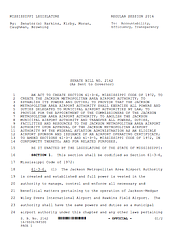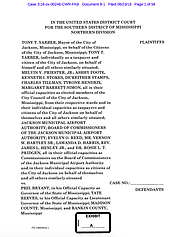Sen. Josh Harkins, R-Flowood, (right) does not believe that the citizens of Jackson will suffer any less representation with the new configuration of the airport’s board. Sen. John Horhn, D-Jackson, (left) disagrees vehemently. Photo by Arielle Dreher.
JACKSON — The saga of who controls the Jackson-Medgar Wiley Evers Airport moves into the federal courthouse, and complex legal mechanizations are now paramount to the question of who owns the land on which the airport sits.
As of late afternoon Friday, June 24, all three major parties opposed to the implementation of Senate Bill 2162, commonly referred to as the "airport takeover" bill, filed motions for injunctions to halt the formation of the new board.
These latest legal volleys come after the City of Jackson, the Jackson City Council and the Jackson Municipal Airport Authority filed a 56-page class-action complaint June 23 on behalf of all Jackson citizens. They joined former JMAA commissioner Jeffrey Stallworth in his ongoing suit against Gov. Phil Bryant, the State of Mississippi, the Legislature, East Metro Parkway and the Mississippi Department of Transportation.
'Severely Prejudiced'
The parties all argue in their motions for injunction that if the court does not intervene that they will "be severely prejudiced" in the event federal court Magistrate Judge F. Keith Ball does not consider their motions.
The move to ask for an injunction has precedent, and as the Charlotte Observer reports in its latest story about the North Carolina fight over the Charlotte Douglas International Airport, an October 2014 injunction from a Superior Court judge allowed time for the Federal Aviation Administration to eventually rule that the courts should decide who has control over local airports. The injunction, by preventing the new board from taking over, might buy Jackson the time it needs to fight the law in court.
Mississippi College School of Law constitutional law professor Matt Steffey said in a June 24 interview that an injunction is normally very difficult to get approved.
"They are very difficult. You have to show both that you are likely to win on the merits and that you would suffer irreparable harm if you don't get an injunction now," Steffey said.
"That you kind of can't undo it," he added, giving the example of a municipality coming to tear down a house. An injunction would then stop the municipality from following through with the demolition until a court could decide.
"Or, once you execute a prisoner, you can't un-execute them," Steffey said with a capital punishment example, emphasizing the severity of the need for an injunction. "You have to show that you are likely to win, and that it is going to be a you-can't-put-the-toothpaste-back-in-the-tube situation."
Steffey said he would be "surprised" if a judge permitted the injunction but admitted that there was always a chance that it might happen.
Sen. Josh Harkins, R-Flowood, author of the airport "takeover" bill, said during a June 24 interview that he didn't see the need for an injunction if the new board wouldn't even be formed and in action until after the Federal Aviation Administration approved the transfer of the operating certificate, without which the airport could not run.
"This is how the FAA requested that we word the legislation," Harkins said.
"The current board will stay in power until a certificate of authority is granted to the new board."
The new board, he said, will meet, organize, adopt by-laws and then make an application for an operating certificate with the FAA, but only after the courts rule on the current case. In this way, Harkins said, the July 1 deadline does not stand as a hard-and-fast deadline for any action. And for him, he said, the court case doesn't cause any worry because after the court determines which party has claim to the airport, the winner would move on to the FAA for approval.
"And the FAA at that point should not have a problem," Harkins said.
Hearings for the injunction motions were all set for Thursday, June 30.
"Once (the new board) got a certificate, the new board would take over, and the old board would sunset," Harkins said. The question then is, how long will the legal wrangling of this issue take?
14th Amendment Violation?
One of the core arguments stated in both the original complaint and the class-action complaint is that the change in airport governance means that the 14th Amendment rights, those guaranteeing equal representation of Jackson citizens, diminishes with fewer seats at the table.
On this point, Steffey said, the situation is different than a seizing of property; what the State is taking is less physical and, thus, more difficult to show.
"This is very interesting because it is not a physical taking in the ordinary sense. They are not taking physical possession, they are not building a road on it, they are not changing the land records regarding it," Steffey said of the State of Mississippi. "They are not recording an easement."
Arguments then cling to the idea that each board member represents a certain chunk of the authority derived from the voting populace that has a vested interest in the airport. In this case, the people of Jackson have a long-term financial interest, which they argue is diminished with the reorganization of the board. Steffey said it is difficult to argue in this way.
"They are changing the management of a corporation who is required by law to act in the public interest to a slightly different entity required by law to act in the public interest.," Steffey said.
The idea, then, from this perspective is that each board member has a certain slice of the people's interest, which Steffey said could be difficult to argue, especially implying that they are being denied a constitutional right to represent.
"And I guarantee you that none of the members have the constitutional right to a certain amount of power, or their vote being worth a certain amount," Steffey said.
"In other words, none of those individual people could come in and say, 'my vote's been diluted." Although, he wouldn't leave out the possibility. "I'm not saying that court can't be persuaded to see it that way."
To Harkins, it is not a question because Jackson still holds a majority position on the JMAA board, even if Hinds County itself does not have a dedicated board member. He said he considered it originally, but that "because all of the Jackson residents are in Hinds County already" that it was simpler to have them all reside in Jackson.
In Harkins' opinion, Jackson would not lose any influence because the City would still hold the majority of seats on the board. The City and the associated parties believe otherwise, stating in their complaint that only having five of the nine spots on the board prevents their "effective and meaningful participation."
"The selection scheme that is mandated by SB 2162 thus deprives the Individual Plaintiffs and the citizens of the City of Jackson of effective and meaningful participation in the affairs of Jackson-Medgar Evers International," the complaint states.
Email city reporter Tim Summers, Jr. at [email protected]. See more local news at jfp.ms/localnews.
More stories by this author
- DA Smith Wins on One Count, But Passes on 'Whistleblower' Bad Check Claims
- Mayor Yarber, Socrates Garrett Address Contracting Dispute, 'Steering'
- UPDATED: Jury Finds Allen Guilty for Cell-phone Payment, Not Guilty on Nine Counts
- Allen Trial: Defense Rests After Making Case DJP Doesn’t Collect 'Taxes’
- DJP Board Attorney Gibbs Takes Stand to Defend Ben Allen's Actions





Comments
Use the comment form below to begin a discussion about this content.
comments powered by Disqus